At sunset, it became Wednesday, the 13th of Nisan – the day of preparation for the Passover.
-
- Using Mark’s account, in chapter 14:17, he said, “When it was evening,” meaning when Tuesday ended, and Wednesday began, Jesus came with His disciples to the Upper Room, and as they entered, the disciples argued over which one was going to be the greatest in the Kingdom of God.
- Jesus got up, girded Himself with a towel, poured a basin of water, and began to wash the disciple’s feet, showing them that the greatest among them would become the servant of all the others.
Mark said, “And as they were reclining at the table and eating.”
-
- The picture of the Lord’s Supper with Jesus and the disciples sitting in chairs is contrary to the culture of that day.
- Men reclined on their sides, propping themselves up with one hand, or perhaps with a pillow, and they ate with their other hand – sopping the bread into the various dips.
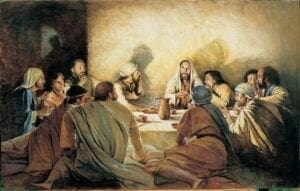
Jesus said, “Truly, I say to you that one of you will betray Me; one who is eating with Me.” They began to be grieved and to say to Him one by one, “Surely not I?” And He said to them, it is one who dips with Me in the bowl. For the Son of Man is to go just as it is written of Him, but woe to that man by whom the Son of Man is betrayed! It would have been good for that man if he had not been born.”
-
- Evidently, none of the disciples suspected Judas as being any different from them.
- They could not imagine one of them betraying Jesus, at least intentionally, which is why they asked Jesus which one it was.
- For three years, Judas had been a part of Jesus’ ministry – even trusted with the treasury they used to buy their food.
- Jesus knew Judas had already made his deal with the Chief Priests, and this was his last opportunity to repent from his evil plot or prepare to stand before God without any justification for his evil actions.
Mark 14:22, “While they were eating, He took some bread, and after a blessing, He broke it, and gave it to them, and said, “Take it; this is My body.”
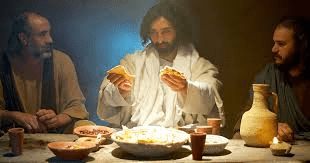
When the bread was lifted up at the Passover, the head of the meal would say: “This is the bread of affliction which our fathers ate in the land of Egypt. Let everyone who hungers come and eat: let everyone who is needy come and eat the Passover meal.”
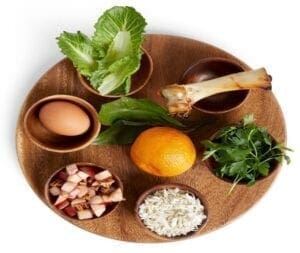
Everything eaten at the Passover meal had a symbolic meaning:
-
- The bitter herbs recalled the bitterness of slavery the Hebrews had endured in Egypt for 400 years.
- The saltwater reminded them of the tears their forefathers shed living under such oppression.
- The lamb reminded them of the blood sacrifice God accepted, allowing His judgment of death to pass over the household where the blood was placed on the doorposts by faith.
- In lifting up the bread, Jesus was saying He was the fulfillment of those symbols; His death was not regarding the suffering the Jews experienced as slaves in Egypt, but the suffering the world is enduring as slaves to sin, and that He had come to give His life to set those captive sinners free!
Mark continued: “And when He had taken a cup and given thanks, He gave it to them, and they all drank from it. He said to them, “This is My blood of the covenant, which is poured out for many. Truly I say to you; I will never again drink of the fruit of the vine until that day when I drink it new in the kingdom of God.”
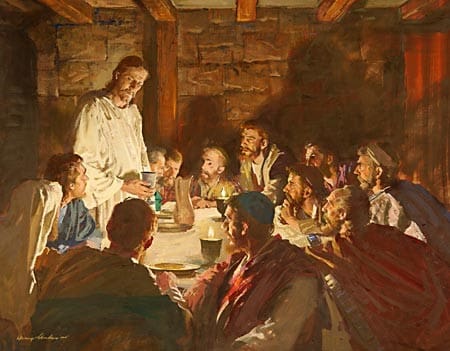
With the new meaning of the bread and the cup, Jesus was establishing a “new covenant,” which would be sealed by His shed blood.
-
- No one could institute a new covenant between God and man, although many religions have tried to do that. Jesus could because He was the God-Man.
- This new covenant was not based on man’s outward obedience and God’s temporal blessings, but upon the inward transformation of our lives and the eternal forgiveness of our sins, which restored our broken relationship with God.
- Jesus has not yet celebrated a Passover in heaven.
- He is waiting for all those who will receive Him to be gathered unto Him, and then there will be a great supper.
- In Revelation 19:9, John described it as the marriage supper of the Lamb, and the Kingdom of God will be complete.
Prayers for the observance of the Lord’s Supper.
-
- “Heavenly Father, thank You for giving us Jesus, the Bread of Everlasting life, and as we receive this bread into our bodies, we ask that You would allow us to renew the openness of our heart to receive Jesus as our Savior and our Lord. Father, we thank You for loving us so much that You were willing to sacrifice Your only Son, that whoever would believe in Him would not perish but have everlasting life. Thank You for allowing His shed blood to cover our sins, and we look forward to that day, with great anticipation, when we will join with Him in that great Marriage Supper. As we eat this bread and take this cup, reaffirming our covenant with You, we ask You to constantly remind us of the cost of our sin and the price of our eternal salvation. In Jesus’ name. Amen.”
Mark said, “After singing a hymn, they went out to the Mount of Olives.” A Passover meal always concluded with the singing of three Hillel Psalms – Psalm 116-118. As you read portions of Psalm 118 in the King James translation, think about what the Psalmist was saying and what the Lord Jesus was facing.
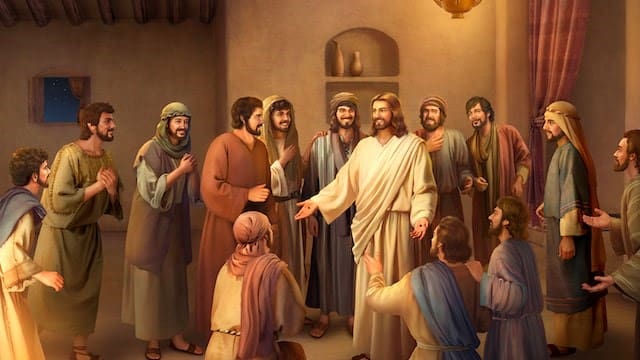
O give thanks unto the Lord; for he is good: because his mercy endureth forever. I called upon the Lord in distress: The Lord answered me and set me in a large place. The Lord is on my side; I will not fear: What can man do unto me? The Lord taketh my part with them that help me: Therefore, shall I see my desire upon them that hate me.
All nations compassed me about: but in the name of the Lord, will I destroy them. They compassed me about; yea, they compassed me about: but in the name of the Lord, I will destroy them. They compassed me about like bees; they are quenched as the fire of thorns: for in the name of the Lord I will destroy them.
The Lord is my strength and song and is become my salvation. The right hand of the Lord is exalted: I shall not die, but live, and declare the works of the Lord. The Lord hath chastened me sore: but he hath not given me over unto death.
I will praise thee: for thou hast heard me, and art become my salvation. The stone which the builders refused is become the headstone of the corner. This is the Lord’s doing; it is marvelous in our eyes.
This is the day which the Lord hath made; we will rejoice and be glad in it. Save now, I beseech thee, O Lord: Blessed be he that cometh in the name of the Lord: we have blessed you out of the house of the Lord. Thou art my God, and I will praise thee: thou art my God, I will exalt thee.
Join us tomorrow as we continue our journey “From Gethsemane to Golgotha to Glory!”
